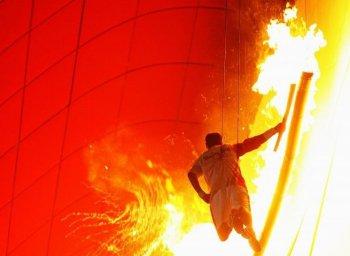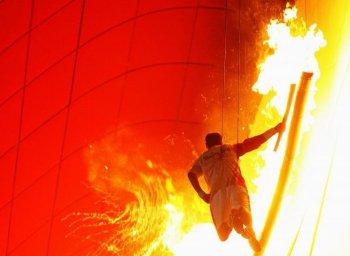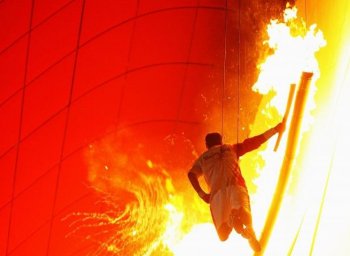China’s most celebrated gymnast seemed to reach a peak of success when he flew across the Bird’s Nest Stadium to light the Olympic torch in the opening ceremony for the Beijing Olympics in August 2008. A little over two years later the business affairs of Li Ning, the man known to everyone in China as the “prince of gymnastics,” were in shambles.
Li worked to bring the Olympics to China. In 2008, the CCP state media Xinhua carried an article describing how Li’s company was an enthusiastic sponsor during Beijing’s application to host the Olympics. As a former Olympian medalist—he won three gold medals, two silver medals, and one bronze medal in the 1984 Olympics—his support had special significance.
The Beijing Olympics were not just about sport, though. Prior to the awarding of the Olympics to China a several-years-long propaganda effort had begun that was aimed at making the case to both domestic and foreign audiences for the legitimacy of the rule of Chinese Communist Party over China.
The scholar Anne-Marie Brady in an article in The China Quarterly describes this as a “campaign of mass distraction: a propaganda campaign designed to mobilize the population around a common goal, and distract them from more troubling issues such as inflation, unemployment, political corruption and environmental degradation.”
Brady also tells how the Olympics were meant to introduce onto the world stage a “new brand” for China, one that would shift international perceptions of China away from images such as those related to the Tiananmen Square massacre.
The climax of this propaganda effort was the Olympic opening ceremony, and the dramatic highpoint of that ceremony was Li Ning lighting the Olympic torch.
Li retired from gymnastics in 1988 and started a business that soon became the number one brand name of sportswear in China, Li Ning Company Limited.
Before the Beijing Olympics, Li’s sportswear company had done well: By the end of June 2008, the company’s net profit had increased 68 percent compared to the same time in the previous year.
Since his moment in the Olympic spotlight, the businesses owned by Li have lost hundreds of millions of dollars in value. The Wall Street Journal reported that two days after Li lit the Olympic torch, on Aug. 11, 2008, the stock price of Li Ning Company Limited tumbled 26 percent.
The stock price of Li Ning Company Limited plummeted further on Dec. 20 and 21, 2010, and the value of the company shrank 4.9 billion yuan (approximately US$720 million).
See Li’s company gets downgraded by Deutsche Bank as stock price plummets on the next page
Li worked to bring the Olympics to China. In 2008, the CCP state media Xinhua carried an article describing how Li’s company was an enthusiastic sponsor during Beijing’s application to host the Olympics. As a former Olympian medalist—he won three gold medals, two silver medals, and one bronze medal in the 1984 Olympics—his support had special significance.
The Beijing Olympics were not just about sport, though. Prior to the awarding of the Olympics to China a several-years-long propaganda effort had begun that was aimed at making the case to both domestic and foreign audiences for the legitimacy of the rule of Chinese Communist Party over China.
The scholar Anne-Marie Brady in an article in The China Quarterly describes this as a “campaign of mass distraction: a propaganda campaign designed to mobilize the population around a common goal, and distract them from more troubling issues such as inflation, unemployment, political corruption and environmental degradation.”
Brady also tells how the Olympics were meant to introduce onto the world stage a “new brand” for China, one that would shift international perceptions of China away from images such as those related to the Tiananmen Square massacre.
The climax of this propaganda effort was the Olympic opening ceremony, and the dramatic highpoint of that ceremony was Li Ning lighting the Olympic torch.
Business Failure
Li retired from gymnastics in 1988 and started a business that soon became the number one brand name of sportswear in China, Li Ning Company Limited.
Before the Beijing Olympics, Li’s sportswear company had done well: By the end of June 2008, the company’s net profit had increased 68 percent compared to the same time in the previous year.
Since his moment in the Olympic spotlight, the businesses owned by Li have lost hundreds of millions of dollars in value. The Wall Street Journal reported that two days after Li lit the Olympic torch, on Aug. 11, 2008, the stock price of Li Ning Company Limited tumbled 26 percent.
The stock price of Li Ning Company Limited plummeted further on Dec. 20 and 21, 2010, and the value of the company shrank 4.9 billion yuan (approximately US$720 million).
See Li’s company gets downgraded by Deutsche Bank as stock price plummets on the next page
Li’s company had announced on Dec. 17 its product order information for the second season of 2011. Orders for clothes and shoes dropped 7 percent and 8 percent respectively. On Dec. 20, the first trading day after the announcement, the company’s stock price dropped 15.86 percent, the largest plunge in a single day since the company went public in 2004.
Li proposed a series of plans to fix the problems, including closing down stores with bad sales records. Li never announced the number of shops he closed. Based on the decrease in orders, he might have closed 500 to 600 stores.
Investment banks have begun to lower Li’s company’s target price (an estimate of a stock’s future price). In JPMorgan Chase & Co’s latest report, Li’s company’s target price was down 22.7 percent and cost 19.4 HKD.
Deutsche Bank downgraded Li from hold to sell and lowered his target price from 24.4 HKD to 14.68 HKD, an almost 40 percent decrease.
Investors also lost confidence in Li due to a failed attempt to use a company owned by Li and his brother to purchase Li Ning Co.
In April 2010, Li and his brother bought over 80 percent of the shares of Viva China with 700 million HKD (US$90 million). Viva China became a capital management platform for Li Ning Co.
On Aug. 31, Li announced his plan to take his 31 percent of shares from Li Ning Co. and put it into Viva China. In effect, Viva China would acquire Li Ning Co.
Viva China announced on Dec. 17 that the Stock Exchange of Hong Kong Limited (SEHK) had ruled that Viva China’s acquisition of the shares in Li Ning Company constituted a reverse takeover. This ruling meant that the acquisition had been denied.
After the purchase was declared a reverse takeover, the stock price of Viva China fell 33 percent. By Dec. 20, the stock price of Viva China was 0.315 HKD per share. In a short three and half months, the stock price fell 60 percent and Viva China lost 7.1 billion HKD (US$912 million) of its market value.
According to market analysts, if Viva China’s appeal against SEHK’s ruling should not be successful, Li’s plan to create a real estate business through Viva China would also fall apart.
Being a classic domestic sportswear brand name, Li’s products were worn in almost all the important sports events by the Chinese athletes who received prizes on the award platform. This achievement ended with the Beijing Olympics in 2008.
In June 2009, Anta Sports Products defeated Li Ning Co. and Adidas and became the official partner for sportswear for the Chinese Olympics Committee and the Chinese Sports Delegation. On Oct. 1, 2009, the gold medal winners of all Olympic Games, including Li Ning, appeared in a parade in Tiananmen Square wearing Anta’s red and white jackets.
In his 17 year-long athletic career, Li won 106 gold medals in various major sports events around the world. In 1999, Li was among the 25 people who were voted the World’s Most Excellent Athletes in the twentieth century by the World Sports Correspondent Association. In 2000, he was inducted into the International Gymnastics Hall of Fame, becoming the first Chinese ever to be included.
Recently, many individuals who have promoted the Chinese Communist Party, both in China and in the West, have come upon bad luck. This article is the first in a series describing such cases.
Email: [email protected]
Read the original Chinese article.
Li proposed a series of plans to fix the problems, including closing down stores with bad sales records. Li never announced the number of shops he closed. Based on the decrease in orders, he might have closed 500 to 600 stores.
Investment banks have begun to lower Li’s company’s target price (an estimate of a stock’s future price). In JPMorgan Chase & Co’s latest report, Li’s company’s target price was down 22.7 percent and cost 19.4 HKD.
Deutsche Bank downgraded Li from hold to sell and lowered his target price from 24.4 HKD to 14.68 HKD, an almost 40 percent decrease.
Viva China’s Value Collapses
Investors also lost confidence in Li due to a failed attempt to use a company owned by Li and his brother to purchase Li Ning Co.
In April 2010, Li and his brother bought over 80 percent of the shares of Viva China with 700 million HKD (US$90 million). Viva China became a capital management platform for Li Ning Co.
On Aug. 31, Li announced his plan to take his 31 percent of shares from Li Ning Co. and put it into Viva China. In effect, Viva China would acquire Li Ning Co.
Viva China announced on Dec. 17 that the Stock Exchange of Hong Kong Limited (SEHK) had ruled that Viva China’s acquisition of the shares in Li Ning Company constituted a reverse takeover. This ruling meant that the acquisition had been denied.
After the purchase was declared a reverse takeover, the stock price of Viva China fell 33 percent. By Dec. 20, the stock price of Viva China was 0.315 HKD per share. In a short three and half months, the stock price fell 60 percent and Viva China lost 7.1 billion HKD (US$912 million) of its market value.
According to market analysts, if Viva China’s appeal against SEHK’s ruling should not be successful, Li’s plan to create a real estate business through Viva China would also fall apart.
No Longer the Olympic Brand
Being a classic domestic sportswear brand name, Li’s products were worn in almost all the important sports events by the Chinese athletes who received prizes on the award platform. This achievement ended with the Beijing Olympics in 2008.
In June 2009, Anta Sports Products defeated Li Ning Co. and Adidas and became the official partner for sportswear for the Chinese Olympics Committee and the Chinese Sports Delegation. On Oct. 1, 2009, the gold medal winners of all Olympic Games, including Li Ning, appeared in a parade in Tiananmen Square wearing Anta’s red and white jackets.
In his 17 year-long athletic career, Li won 106 gold medals in various major sports events around the world. In 1999, Li was among the 25 people who were voted the World’s Most Excellent Athletes in the twentieth century by the World Sports Correspondent Association. In 2000, he was inducted into the International Gymnastics Hall of Fame, becoming the first Chinese ever to be included.
Recently, many individuals who have promoted the Chinese Communist Party, both in China and in the West, have come upon bad luck. This article is the first in a series describing such cases.
Email: [email protected]
Read the original Chinese article.









Friends Read Free